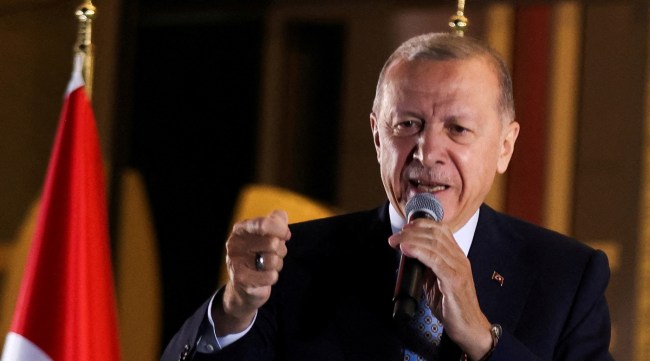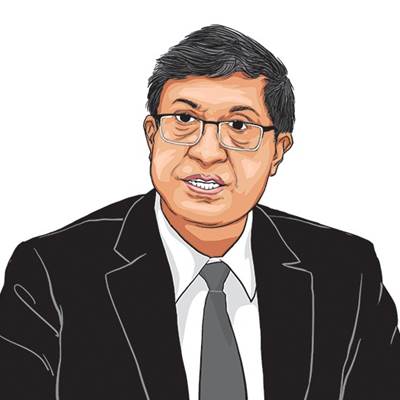Opinion Turkey’s election result: Erdogan’s will, country’s way
With his re-election, the influence of the executive presidency may be strengthened, including through constitutional change. The parliament would play a supportive role in the new system
 Turkish President Tayyip Erdogan addresses his supporters following his victory in the second round of the presidential election at the Presidential Palace in Ankara, Turkey May 29, 2023. (Reuters)
Turkish President Tayyip Erdogan addresses his supporters following his victory in the second round of the presidential election at the Presidential Palace in Ankara, Turkey May 29, 2023. (Reuters) In the end, Recep Tayyip Erdogan prevailed over Kemal Kilicdaroglu in the bitterly contested presidential election runoff, by a margin of over 2 million votes.
Erdogan consolidated his reputation as a leader the people reposed faith in. Hoping to replace the legacy of Mustafa Kemal Atatürk, he announced that Turkey’s century had begun. The opposition feared the secular Republic would slide into a new empire and a caliphate.
It was a historic election for Turkey and reflected deep polarisation. Never before had the people been presented with such starkly opposing choices on the future of the republic, its social and religious fabric, its economic trajectory and its relations with the rest of the world.
In the first round, no presidential candidate obtained a clear majority, but the Islamist-nationalist People’s Alliance led by Justice and Development Party (AK Party) obtained a majority in the parliament, while the opposition Nation Alliance, led by the Republican People’s Party (CHP) saw a reduced share.
Kilicdaroglu tried to build an aggressive campaign for the runoff, based on the fear of freedoms that may be lost if Erdogan was re-elected. He whipped up anti-migrant rhetoric and promised that all Syrians would be sent back. He adopted a nationalist stance and was critical of Erdogan’s handling of security and economic issues. He proposed stable relations with the West and orthodox policies to resolve Turkey’s economic challenges.
However, the Opposition alliance was in disarray after the first round’s defeat and could not campaign with vigour or unity. Kilicdaroglu’s turn to the right proved to be his undoing and he trailed in opinion polls. The Opposition will need to reconsider its strategy and seek new leadership to recover lost ground, before crucial municipal elections next year.
Erdogan, in contrast, relied on his charisma and time-tested strategy of connecting directly with the masses. He assured his followers – poor and rural voters and also new economic elites, who had benefited from his policies in the last two decades – that he would continue to be their patron. He told voters that Turkey needed a strong leader to realise its ambitions in the neighbourhood and on the global stage.
Erdogan declared it a victory for Turkey and all Turkish people. His win in the presidential election puts the AK Party in a strong position. The majority in parliament would make it easier to introduce constitutional change. Senior AK Party leaders said the mandate would allow them to address domestic challenges and foreign policy priorities with a flexible approach. Realpolitik often demands a more moderate approach than the sharp rhetoric of an election campaign.
On the domestic front, the top priority would be restoring the economy and rehabilitating earthquake-affected areas. There was speculation that a technocrat may be appointed to head the Central Bank to bring stability, calm inflation and restore confidence.
However, Erdogan’s preference for unorthodox policies may prolong Turkey’s economic woes. Meanwhile, new economic elites may continue to expand their share in the economic pie, while big business and foreign investments remain cautious. The defence and infrastructure sectors could be beneficiaries.
The influence of the executive presidency may be strengthened, including through constitutional change. The parliament would play a supportive role in the new system. While the judiciary played its due role, the independence of the media came under scrutiny during the elections. The army, internal security and intelligence were closely aligned with state institutions and operations against terrorist forces and Gulenists will likely continue. It would be interesting to see how far Turkey would go in introducing Islamic values into the mainstream or maintaining its secular identity, as enshrined in their Constitution.
Erdogan has a grand vision for a strong Turkey. He is transactional in foreign policy and willing to negotiate. Maintaining an unpredictable stance, hedging options and pushing hardline positions coexist in this approach. He has enhanced Turkey’s space to negotiate while expanding its footprint. As an economic power in a geo-strategic hotspot, Turkey’s foreign policy has an impact beyond its immediate region.
First, Turkey’s Russia policy, which draws much from the personal relationship between Erdogan and Putin, is likely to continue on its trajectory. It provides Turkey with leverage to pursue interests in Syria and Iraq; build bridges with Iran and China; and gives bargaining chips on the Ukraine issue. Turkey’s relationship with China has grown in recent years. However, Turkey will seek to balance its engagement with China and the US, but it could provide a foothold for Chinese presence, while Europe pursues derisking.
Second, Turkey seeks a strong partnership with the US and Europe but feels neglected. Their embrace of Kilicdaroglu was not appreciated. Faced with an economic crisis, Turkey will prioritise the European Political Community and negotiate deals for investments and technology, while accommodating NATO obligations, migrant policy and other issues.
Third, Turkey’s neighbourhood policy is expected to remain aggressive, including the security belt in Syria, strikes against Kurds in Iraq, presence in the Eastern Mediterranean, infrastructure projects in Caspian and pro-Turkik policies in Azerbaijan and Central Asia.
Fourth, the recent rapprochement with the Arab world is expected to deepen. Arabs have seen political Islam weaken in their region and also reached separate understandings with Israel and Iran, which provided better conditions for Turkey’s ties with Saudi Arabia, Emirates, Egypt and others. Syria’s readmission to the Arab League strengthened Bashar al-Assad’s hand and the foreign ministers met recently. But the extent to which Turkey may grasp it remains unclear.
India-Turkey relations have the potential to expand cooperation. Since the 1950s, Turkey preferred to look at our bilateral ties through the prism of Pakistan and the latter’s views on Kashmir. The absence of Turkish officials at the G20 tourism meeting in Kashmir was in line with this approach. AK Party leaders have mentioned a desire for engagement. Both sides collaborated in the fight against Covid-19 and India provided humanitarian assistance to Turkey during the earthquake. Recently, there have been high-level meetings, and both countries are G20 partners. Patient diplomacy can open possibilities.
The writer is a former ambassador to Turkey






